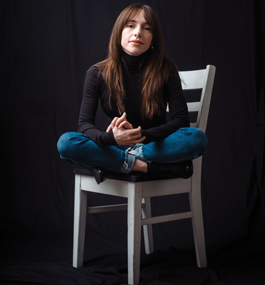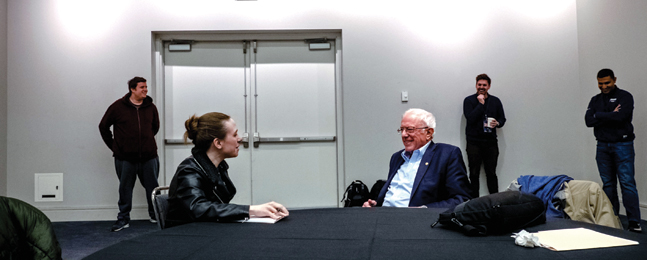The Examined Life
Journalist Elizabeth Bruenig ’13 peers into the human condition’s dark corners to explore sin, guilt and evil.

Graham Marley
Elizabeth Bruenig ’13
by Lawrence Goodman
Imagine for a moment what it’s like to be Elizabeth Bruenig ’13.
Already, at age 30, she has been an opinion writer at The Washington Post and The New York Times. She’s now a staff writer at The Atlantic. Along the way, she was named a Pulitzer Prize finalist in feature writing.
To stay on top of her busy schedule, she keeps a chalkboard in her kitchen that lists upcoming assignments; a desk blotter with her daily schedule; a monthly wall calendar for long-term planning; a meal planner; three-ring binders filled with thousands of documents (she prefers not to read on a screen); and notebooks filled with notes she writes with a uni-ball Vision, her favorite pen.
She has epilepsy, for which she declines to take medication because she hates the side effects. Her risk of seizures is low, so she prefers to take her chances, and fully enjoy her time with friends and family.
Five years ago, her husband, Matt, was diagnosed with autism.
She’s a democratic socialist but holds a number of socially conservative positions. She advocates for a strong Scandinavian-style welfare state but also opposes abortion and extols the benefits of having children early.
A devout Catholic, she converted from Protestantism seven years ago.
On the podcast “The Bruenigs,” which she co-hosts with Matt, she confesses her deepest thoughts and feelings. She has expressed self-doubt and shame about the worthiness of her journalism; fear that her daughter might consider her “a huge loser”; and a desire to “be hidden […] in a place where you almost sort of don’t exist,” to “dissolve into shadow” or “deep water.”
Out of this constant activity, emotional tumult and froth of ideas emerges luminous, scorching prose that plumbs the darkest aspects of human behavior and calls us to listen to our better angels.
Bruenig’s 2019 Pulitzer Prize nomination was for a 10,000-word investigative article she wrote for The Washington Post on the rape of a Texas girl and its devastating aftermath. Bruenig is perhaps the only journalist in America who could write such an account complete with references to the 16th-century French essayist Michel de Montaigne and English Romantic poet William Wordsworth; ruminations on the nature of guilt and conscience; and lyrical passages like this description of Dallas: “The city is wide and magisterial, with a crest of glittering lights marking its heights in the darkness. On a clear night with bright stars, the city and sky can lose their seam.”
Following a different path
Bruenig had her first religious experience at 14. She was doing lunch duty in the cafeteria at her middle school in northeastern Texas, wiping tables, when her body started shaking and jerking. As she has described it, she wriggled “on the linoleum like a dying fish in a pleated skirt.”
Medically speaking, it was her first epileptic seizure. But as Bruenig pondered the experience, she thought something more sublime had happened to her. On the day before the seizure, she’d been “ambiently and weirdly out of it,” she says, and “very introspective.” After the seizure, she again retreated into her head, convinced there was something more to her experience than changes in brain chemistry.
It wasn’t that she’d had a vision or seen an aura, but she felt she’d somehow been touched by a divine presence, though she couldn’t tell what God intended to convey. The experience “had to have some meaning,” she says, “even if I didn’t know exactly what it was. There was something there.”
Bruenig grew up middle-class in Arlington, midway between Dallas and Fort Worth, home to the Texas Rangers, the Dallas Cowboys, and the International Bowling Museum and Hall of Fame. The city was named in honor of Confederate Gen. Robert E. Lee’s hometown in Virginia.
Though the area is heavily evangelical, Bruenig’s parents were cafeteria Methodists. They wouldn’t go to church on Sundays if it meant missing a football game on TV. What they lacked in religious zeal, they made up for in their allegiance to the Republican Party. They were strong supporters of Ronald Reagan and George H.W. Bush, and backed Ted Cruz in the 2016 presidential primary before switching their loyalty to Donald Trump.
As a student at Arlington High School, Bruenig had long political discussions with her AP European-history teacher, a self-described social democrat, and on the debate team she argued both sides of such issues as universal health care, the moral obligations of corporations and the use of lethal force against those who commit domestic violence. “I was always persuaded by the left’s position,” Bruenig says. “I very quickly knew my commitments were different from my parents’.”

Hilary Swift
A JOURNALIST’S EYE: Bruenig interviews Sen. Bernie Sanders in Detroit for The New York Times on the eve of Super Tuesday in March 2020.
page 2 of 4
One day during the fall of her sophomore year, Bruenig saw several cars in the senior parking lot with “FAITH” written on the windshields. It wasn’t an expression of religious devotion. It was a profane acronym aimed at Amber Wyatt, a junior who had recently told police she’d been raped by a group of boys inside a shed off a remote dirt road. “F*** Amber in the head” (others said the letters stood for “F*** Amber in three holes”) was some classmates’ response to her allegations. Wyatt soon moved to another school.
In 2015, two years after graduating from Brandeis, Bruenig decided to find out what had happened to Wyatt. First as a staff writer for The New Republic, then when she moved to The Washington Post, Bruenig examined court documents; interviewed school officials and prosecutors; and tracked down and talked with Wyatt, who’d gone through a period of drug abuse and had attempted suicide but was now in college, studying psychology.
A dozen years after the rape was first reported, Wyatt’s account was credible yet couldn’t be proved. At the same time, Bruenig’s investigation revealed systemic failings in her hometown’s school and legal systems, and the community’s callousness, indifference and even brutality in the wake of a situation that called for compassion and caring.
Wyatt’s plight “still troubles me now — it will always be unresolved — and I hope that it troubles you because the moral conscience at ease accomplishes nothing,” Bruenig wrote in her Washington Post story about the rape, the piece that became a Pulitzer finalist for feature writing.
During Bruenig’s final year at Arlington High, she met her future husband, Matt Bruenig, the captain of the debate team. They spent many weekends competing statewide.
At 6 feet, 1 inch, Matt is a foot taller than Bruenig. When they were teenagers, she sometimes had to duck to avoid being hit by his elbow when he swung around. They came from different economic backgrounds. He’d grown up economically distressed. For a short time, his family was homeless.
They were both social misfits, Bruenig geeky, Matt socially awkward. They didn’t attend the high school’s Friday-night football games. They weren’t interested in joining the evangelical students who, incensed that prayer wasn’t allowed in the classroom, would gather at the flagpole outside school for religious services. Instead, they talked for hours about politics; debate strategy; documentaries about the Weather Underground band, Ralph Nader and the civil rights movement; and their favorite movie, “The Royal Tenenbaums.”
On “The Bruenigs” — the podcast Elizabeth describes as “low-effort, low-quality” — the couple discuss pretty much everything: welfare policy, religion, their two daughters, ads for SpaghettiOs and who takes the blame when the fitted sheet pops off the mattress corner.
They laugh at each other’s jokes and finish each other’s sentences. Fascinated with what the other has to say, they seem just plain happy to be around each other. “Matt and I have been talking [together] for 14 years,” Bruenig said on a recent episode.
‘I also have a dark inner world’
In her first year at Brandeis, Bruenig took a seminar with Reuven Kimelman, a professor of Near Eastern and Judaic studies, that centered on the Torah and the rabbinical commentaries. Kimelman was “a very rigorous thinker, demanding in the best sense,” Bruenig says. “I had never been exposed to anyone with that level of intellectual curiosity and integrity.”
One day after class, Bruenig asked Kimelman if Christianity had a body of writings comparable to Judaism’s. He pointed her to the magisterium, the compendium of decrees, bulls, letters, encyclicals and speeches written by Catholic Church theologians over the past 2,000 years.
Bruenig holed up in the library and read. Much of her learning at Brandeis was self-motivated, she says, encouraged by “the spirit of free intellectual inquiry at the university. There wasn’t a sense that asking too many questions was risky. It was spiritually enriching.”
She found a fellow traveler in Saint Augustine, the fourth-century philosopher. In his autobiographical “Confessions,” Augustine describes his anguish over leading a sinful life, and his finding salvation by converting to Catholicism and embracing its teachings. Like his other writings, it’s a dark book preoccupied with lust, original sin and the nature of evil.
“I also have a dark inner world,” says Bruenig. At the time, she felt burdened by guilt and spiritually adrift, yearning for a closer relationship with God. Augustine seemed to point the way forward. “I loved his clarity of mind, his incredible intellect, his dazzling charisma,” she wrote in a 2017 essay published by the Catholic journal America.

Courtesy Elizabeth Bruenig
FAMILY TIME: Bruenig at her daughter’s fifth birthday party this summer, in front of the chalkboard wall she uses to plan dinners.
page 3 of 4
During her sophomore year, Bruenig took a class with Robin Feuer Miller, the Edytha Macy Gross Professor of Humanities, and discovered Fyodor Dostoevsky, the 19th-century Russian novelist who examined guilt, sin and evil. (Like Bruenig, he also had epilepsy.) She would come to Miller’s office hours and send her lengthy emails discussing Dostoevsky’s theology. She wrote a paper on whether Svidrigailov, the child molester, adulterer and almost-rapist in “Crime and Punishment,” had a shot at redemption.
Miller remembers Bruenig as intense, brilliant and deeply thoughtful. “She was one of those students where the instructor feels she’s learning as much from the student as the student is learning from her,” Miller says.
After Brandeis, Bruenig attended the University of Cambridge on a Marshall Scholarship, earning a master’s in Christian theology. On Easter Day in 2014, she left her apartment around 3 a.m. and walked to Fisher House, a converted inn that houses the university’s Catholic chapel. Inside, one of her theology professors summoned her to the pulpit to receive the Eucharist. Back in Texas, the sacrament had been sweet King’s Hawaiian bread and Welch’s grape juice. Here, it was a stale wafer and vinegary wine. “I was coughing and sputtering,” Bruenig says. “I was like, ‘Christ, they’re going to think I need an exorcism.’”
As dawn broke and light streamed through the windows, illuminating the dark space, Bruenig recited the baptismal promises. “Do you renounce Satan, and all his works and empty promises?” her professor asked. “I do,” she answered. Then he anointed her head with holy oil, and that was it — she was a Catholic.
After her conversion, Bruenig slept soundly for the first time in months. She had been wrangling with deep existential and spiritual questions. She felt that Protestantism, in which one’s relationship to God was personal, undirected by any central religious authority, placed too much responsibility on each individual to figure things out. Catholicism seemed to have the answers, a perspective she found “deeply comforting,” she says.
As a consequence of God’s exiling Adam and Eve from the Garden of Eden, Bruenig says, we are all fallen. We share a common humanity and plight that should be the basis for universal empathy and compassion. Such a love for one another reflects God’s love for us, bringing us closer to God’s perfection and divinity.
She accepts the Catholic Church’s position on abortion, which, as she has written, she considers the taking of human life. Although adherents may have objections to some church teachings or beliefs, “quite a bit of work goes into establishing what should be in the creed,” she says. “When that’s established, you either sign up, or you don’t.”
At both The Washington Post and The New York Times, Bruenig has written extensively about the Catholic Church’s sexual abuse scandals, expressing disgust and urging the church to come clean about its transgressions. But her ultimate faith in the church remains unshaken. “I just don’t have any choice,” she says. “I believe it to be true. I need that for the salvation of my soul.”
Bruenig has a certain nostalgia for a particular aspect of the European Middle Ages — not the feudalism that inflicted so much misery, nor the oppression of Jews, women, Muslims and others, but the Christian ethos that posited a humanity shared by all people, regardless of wealth.
In the Middle Ages, “it was understood that the people at the very bottom of society were still entitled to a dignity in their station that could not be taken from them,” she says. But with the rise of capitalism, property rights became sacrosanct, enshrined as part of the natural order. The rich appropriated to themselves the humanity that God had bequeathed to all.
‘It’s who he is’
In May 2016, two years after the Bruenigs were married, Matt was fired from his job as a part-time blogger at Demos, a progressive-policy think tank and advocacy group in Washington, D.C. He’d gotten into a Twitter spat with Neera Tanden, then the head of the Center for American Progress, a prominent liberal-leaning policy institute, over welfare reform. He called her a “scumbag.” Matt had tested the limits of online discourse before, calling one journalist a “hack” and another a “complete human failure at business.”
The press dubbed the dust-up “Bruenighazi,” with Matt’s supporters saying Tanden, an establishment Democrat, forced him out of his job because he supported Bernie Sanders. When Matt started a GoFundMe page called “The Bruenig Bailout,” he raised nearly $25,000 in three hours.

Graham Marley
IMMERSED IN IDEAS: Bruenig at home in Stamford, Connecticut.
page 4 of 4
About a month later, Matt’s sister, Heather, was murdered, stabbed to death in her trailer in Arlington. Matt’s reaction was strangely muted. “I went down to Texas, did my duties in that regard” is how he describes it now, adding, “I don’t know. How do you react to something like that? I felt very bad. I guess I just carried on.”
Matt had long struggled with processing emotional experiences, whether they were his or someone else’s. When he got nervous in social situations, he sometimes just walked away without explanation. He didn’t realize others would think that was rude. He had trouble making sense of people’s emotions. He wasn’t always aware of how his words would be interpreted. He had a tic where he rapidly tapped the side of his nose with two fingers when he felt socially uncomfortable.
Bruenig says she’d suspected since high school that Matt was autistic, but his day-to-day functioning seemed good. Now, with his firing and his sister’s murder, she worried everything was becoming too much for him to handle. She suggested he see a therapist.
After several meetings and a battery of tests, Matt was diagnosed with autism. His tic is what’s called stimming, repetitive movements or sounds that are a common symptom of the disorder. Matt handled the diagnosis in stride. “He wasn’t depressed or bothered because he’s so logical,” Bruenig says. “He was like, ‘Well, it doesn’t change anything. I’m no different.’”
Bruenig was equally nonplussed. Matt has his idiosyncrasies, and, however medical science might view them, to her they were still just that — idiosyncrasies. “It’s who he is,” she says. They share what she describes as a dry and “Dada-esque” sense of humor.
“You make me laugh every day. You’re the least judgmental person I’ve ever known,” Bruenig told Matt on a recent podcast. “Your moral instincts are very sharp, I guess because you’re not influenced by society at all. And I don’t mind [the autism] at all. People ask me, and that’s my position. I love you. I love you. I think you’re very, very special.”
Today, Matt works at the People’s Policy Project, a progressive think tank he founded in 2017. He says autism has given him the ability to focus on a single issue for long periods, allowing him to become an expert on welfare policy. Bruenig says she deeply admires his commitment to social justice.
Bearing witness
Last December, Bruenig traveled to Terre Haute, Indiana, to witness an execution. The prisoner, Alfred Bourgeois, was convicted in 2004 of torturing and killing his 2-year-old daughter in Texas. He had been on death row ever since and might have remained there had not the Trump administration decided to resume capital punishment for federal prisoners. Although Bourgeois’ lawyers argued he was mentally disabled, with an IQ of 70, the U.S. Supreme Court declined to hear his appeal.
Bruenig sat in one of three observation rooms surrounding the chamber where Bourgeois lay strapped to a gurney. In a New York Times column, she explained she felt deeply conflicted about his death. “The impulse to erase from the earth every trace of a crime as monstrous as Mr. Bourgeois’ still arises in me, at times, pitting my emotions against my intellect,” she wrote.
She watched as someone hidden behind a wall injected Bourgeois with pentobarbital. “Mr. Bourgeois’ trim white beard dips and rises as his jaw begins to work, and then his mouth gapes once, a wide, ghastly gulp for air,” Bruenig wrote. “His belly begins to twitch and then convulse rhythmically.”
When it was over, Bruenig stepped outside into a rainstorm and threw up.
Now that she is at The Atlantic, having left The New York Times in May so that she can write long-form essays and opinion pieces, she intends to go to more executions.
On her kitchen chalkboard, there’s a list of other subjects she plans to pursue: sexual assault, sex abuse by the clergy, pornography, suicide, self-harm, addiction, loneliness. It’s bleak stuff, but it reflects the fascination with guilt, evil and redemption she’s had since college.
As a journalist and a Catholic, she hopes to spread compassion and understanding for perpetrators and victims alike. “Somebody’s got to bear witness,” she says. “You see the lowest places a person can go, and you find them there, and you walk with them.”
